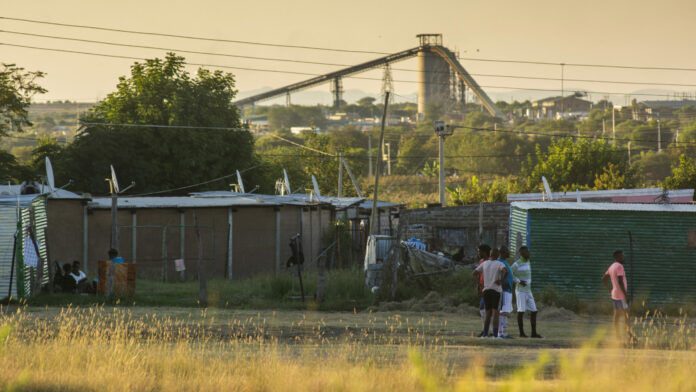
ABOUT 50 employees at Sibanye-Stillwater’s Marikana mine were held hostage over two nights in May, according to a letter addressed by the company to the alleged perpetrator, the Marikana Unemployment Forum.
Sibanye-Stillwater says instances such as this are not uncommon. “It’s a frequent occurrence,” said James Wellsted, senior vice-president of corporate affairs at the gold and platinum group metals miner. “Generally, we’re able to manage it, but it’s a problem as a result of the political environment. There’s a lot of stuff going on in the background.”
According to a June 11 letter, signed by Ansie Malan, Sibanye-Stillwater’s legal advisor, the forum was ordered to repay R2.26m representing lost PGM ounces that ought to have been mined during the forced lock-in of employees.
Thabisile Phumo, head of stakeholder affairs at Sibanye-Stillwater said in this particular case the forum’s leaders enlisted community members – some of whom might not be employees – to march to the K3 shaft at Marikana. Led by Sean Manyako, they locked the gate at 6pm on May 11. Employees were eventually released on the evening of May 12.
“It’s a risk because some employees could have health issues and there’s also the trauma of the event. It’s a health and safety risk,” said Wellsted.
Said Phumo: “We do anticipate more of this. It’s difficult to call Marikana because we have had stability and the environment has generally remained stable. We have been engaging robustly, informing the community on what we are doing, hoping for peace”.
Community demands turn on jobs and procurement opportunities. Sibanye-Stillwater says it keeps an open door policy provided community members follow the channels. While it claims its intelligence is good, protests sometimes take it completely by surprise.
Around the same time of the hostage lock, the so-called N4 Cluster Group, chaired by former Samancor contractor, Solly Soka, blockaded the road which is the main means by which stores, people and other equipment get to and from Sibanye-Stillwater’s mines.
It’s unclear what Soka, who isn’t a resident in the North West community, is aiming to achieve from such actions, but a senior PGM company executive, who declined to be named, says it’s quite often to display political influence that might eventually prise open a position over municipal affairs.
Now, with the tenth anniversary of the Marikana atrocity on the horizon (August 16) and the ANC’s elective conference scheduled for December, the political temperature in society is rising. “Should there be any instability or heightened political conflict, we get caught in the middle. We get caught in the cross-fire,” Phumo said.
South Africa’s mines are often the only employer in their region. That’s true of Sibanye-Stillwater, Impala Platinum and Anglo American Platinum in the Rustenburg region. Dairy group Clover last year shut its cheese-making factory in Lichtenburg, about an hour-and-a-half’s drive west of Rustenburg owing to municipal dysfunction which is the backdrop to the community protests that swamp miners.
In June, South Africa’s auditor-general, Tsakani Maluleke painted a bleak picture of local government performance. Only 16% of the country’s 257 municipalities were given a clean bill of health. Among the somewhat less dysfunctional is Rustenburg.
According to the report, however, the standard of living in the municipality is hardly sustainable: only 36% of its approximately 550,000 residents have pipe water delivered to their dwelling; residents with flush toilets connected to sewage totals 53%. As alarming is the municipality’s 26% unemployment rate, which rises to 35% for its youth.
Speaking to Miningmx in June, Neal Froneman, CEO of Sibanye-Stillwater described the deteriorating condition of the country’s municipalities as “a time bomb”. He added: “The country has gone backwards very significantly … and after the riots of last year (triggered in KwaZulu-Natal and Gauteng provinces following the imprisonment of president Jacob Zuma), they’re just a sign of what’s coming”.
Mining companies, and even the larger contractors, think increasingly that supplementing municipal functions will become a common practice.
“I just think that’s going to become the norm,” says Keith Scott, CEO of Fraser Alexander, a tailings management company. “What we’re doing to a smaller extent is taking ownership of some of those issues in those communities.”











